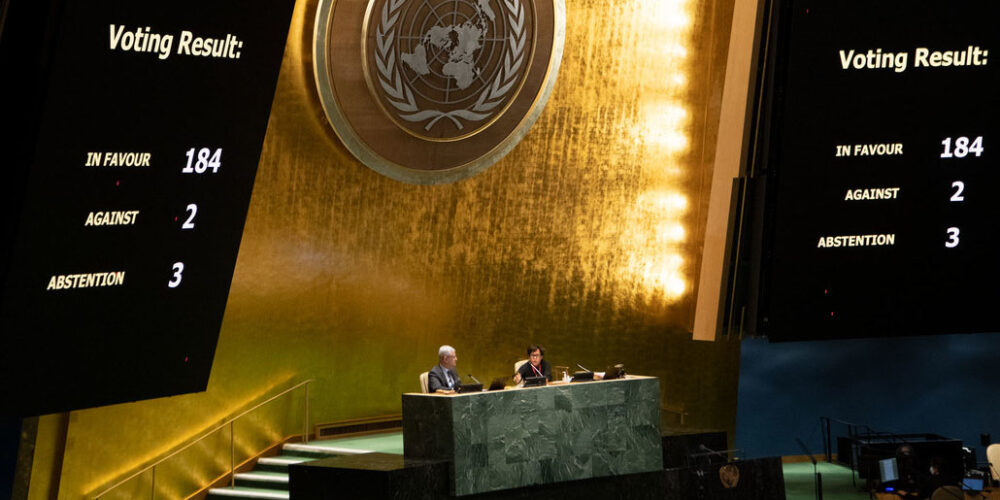The Americas are very much the front line in the struggle against US imperialism’s drive for unipolar, planetary dominance. The United States first tested its Monroe Doctrine there—the brazen assumption that the entire continent is America’s “back yard”—and has since sought to export this sense of colonial proprietorship throughout the world.
In the prologue to his Versos Sencillos, the great Cuban revolutionary and writer José Martí prophetically imagined the imperial eagle clutching the flags of all the nations of the world in its blood-stained talons. But, just as surely, Martí also laid the basis for the anti-imperialist tradition and unity of revolutionary purpose that will deny that nightmare dominion over reality by resisting the efforts of the United States to destroy and simultaneously create the world in its own self-image.
The vote on 23 June at the United Nations against the illegal blockade of Cuba has once again shown that the concept of Yankee exceptionalism retains merit solely as a descriptor of US hypocrisy. 184 states voted to end the criminal blockade, the sixty-year campaign of economic warfare, which does not qualify as “sanctions,” precisely because there are no international laws providing legal sanction to these unilateral coercive measures that collectively punish the Cuban people for having the fortitude to overthrow imperialism and assert their sovereignty.
The blockade violates the UN Charter, to which all member-states must sign up; and so, if the United States were truly the purveyor of a “rules-based system” it would eject itself from the United Nations and submit itself to international law for all its crimes.
There are only two possible options when it comes to explaining how and why the US urge to dominate the entire world is doomed to fail. Firstly, if the United States is allowed to, its sociopathic capitalism will brainlessly destroy all human life (and many other species besides). So there will be no world left to subjugate, and no-one left to exploit, only the forlorn fluctuations of algorithms on hedge fund and stock market computers programmed to pursue relentlessly the logic of profit to its illogical conclusion by their deceased capitalist masters.
Secondly, and much more affirmatively, capitalist imperialism’s monomaniacal push for the abstract survival of its instrumental reason in a dead world will have been stopped in its tracks by revolutionary mass mobilisation and the overthrow of this murderous system of exploitation.
The requisite levels of organisation and revolutionary consciousness (most crucially anti-imperialism) in the Americas are already well grounded and world-leading, and these movements will spearhead the internationalist fight against capitalism. All anti-imperialists around the world can take lessons and inspiration from comrades in the Americas, as well as taking up their generous hospitality by joining them in struggle. Such solidarity is urgently required, both in defending revolutionary ground already held in the region and in pushing back against state violence and repression where US puppet regimes are in power.
The neoliberal model that the United States has sought to foist upon the Americas and the world is now propped up by outright violence and coercion. The myth (and it was of course always a myth) of the “end of history” and a benign, progressive capitalism, whose market-driven logic would secure democracy and prosperity for all its “stake-holders,” has been utterly hollowed out.
Whatever traction the fantasy narrative of neoliberal progress had in some quarters (including the centrist and liberal versions of leftism), this myth has used up all its ideological credit. As the sickening terror against trade unionists and members of social movements inflicted by the US-NATO puppet state in Colombia illustrates daily, as shown by the fully militarised response to popular protests with relatively modest egalitarian aims in Chile or Ecuador, or as manifested by the current imperialist and oligarchic manoeuvres to overthrow the democratic election of Pedro Castillo as president in Peru, neoliberalism is the antithesis of freedom, not its guarantor.
Equally, where anti-imperialists have gained power—in Cuba, Venezuela, Nicaragua, Bolivia—it is imperative that we help defend these revolutionary successes, and learn from them. Bolivia is notable for how the people fought back against a US coup that brought vile fascists to power, helped, of course, by “liberal” imperialists, progressives and so-called eco-warriors, who all parroted verbatim CIA lies and convinced themselves they were saviours, when in fact they offered ideological cover for an empire’s self-entitled desire to monopolise lithium reserves.
Continued vigilance and solidarity are required regarding Bolivia and most certainly needed in regard to Venezuela and Nicaragua, where, in the case of the latter, a full-blown coup is already under way and will seek to delegitimise the forthcoming re-election of the overwhelmingly popular Sandinista president, Daniel Ortega.
The imperialist overreach of a rogue state that thinks the whole planet is its “back yard” will find instead that the world is ultimately the graveyard of its plans. Internationalist solidarity offers the total horizon through which to realise the necessarily planetary scale of the struggle against US hegemony.
We must join our comrades in the Americas and around the world in playing our part in dismantling the circuitry of the imperialist system that makes the continuing violence of neoliberalism possible. Our comrades have heroically held the front line, and we can mutually replenish our strengths by intensifying our joint struggle to create that better world that awaits us when we finally negate the injustices and iniquities of capitalism and imperialism.






